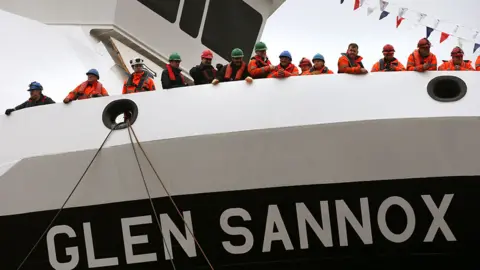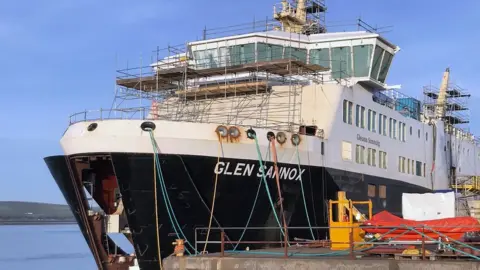Ferry fiasco: Slipway slips continue

 PA Media
PA Media- If you thought the disastrous CalMac ferry-building contract has been put back on track, think again. New evidence from the official watchdog points to continued dysfunctional relations between different arms of the Scottish government that should have got it sorted.
- Even up to this year, four years behind schedule, risks are still being raised that the ships may not be accepted on handover and may not get their safety certificates if continuing problems are not addressed.
It is 27 months since the Scottish government stepped in to nationalise the shipyard where the building of two CalMac ferries had gone so badly wrong.
It is 15 months since a Holyrood committee set out its findings that there had been "catastrophic failings" in the contract.
So you might think there has been time to sort things out.
Yes, the ferries are more than three times the original budget, and more than four years late, but surely - you might hope - the problems have been identified, ironed out, and everyone is aligned and on track to finish the job?
Well, the watchdog of public spending, Audit Scotland, has taken a close look, and the answer is, er, no. The Cal-Mac calamity blunders on.
To be fair to the ferry operator, it's the one element of this sorry tale that shoulders the least blame. Yet it takes the most pressure, from the islanders who depend on it, and who are fed up with an ageing fleet of unreliable ships.
In the 72-page report, there is much that will be familiar to those who have followed the story, and a lot of it is assessment of complex contractual arrangements for a complex manufacturing process.
It spells out the way in which Scottish ministers overruled their own expert procurement agency to ensure the contract went to the Inverclyde yard, without the usual financial guarantees if the contract went wrong. Which it did.
No record was kept of why that decision was made. Repeat: "No evidence" of the decision at the root cause of what has gone wrong.
 PA Media
PA MediaSays Kate Forbes, the economy secretary, responding to Audit Scotland: "The procurement process for the vessels was undertaken thoroughly, in good faith and following appropriate due diligence".
She does not add that the findings of said due diligence were then ignored.
The watchdog also reminds us of the £45m in loans approved by ministers as the former shipyard owner reported serious problems with the contract. These were granted without tying adequate conditions to them, and without public scrutiny.
And it exposes the lack of knowledge the Scottish government had of the state of the shipyard and the project at the point when it took them over, at the point of the former company going into administration in August 2019 moving to full nationalised ownership from December that year.
"The Scottish government made the decision to nationalise the shipyard without a full and detailed understanding of the amount of work required to complete the vessels, the likely costs, or the significant operational challenges at the shipyard," the report says.
'Slowing progress'
It is in the later sections, post-nationalisation, that a less familiar story emerges, and it is one of profound and continuing problems.
An update on increases to costs and delays to delivery is expected imminently.
Both look set to be considerably worse. We recently learned that cabling is too short for the current design, so it has to be removed and replaced. Not just a few cables, but 1,400 of them, delaying the installation of 8,400 more.
 PA Media
PA MediaWhat we did not know, until Audit Scotland's report, includes:
- After nationalisation, remedial work was due to take seven months. It was still continuing after 20 months, with new elements of remedial requirement being found.
- "Not a single programme completion date was met in 20 months", according to an update at the start of this year.
- In the middle of last year "progress against detailed plans was absent because detailed plans for the vessels did not exist".
- In January of this year, the Scottish government's procurement agency, Caledonian Asset Management Limited (CMAL) was complaining that plans were still not detailed enough.
- It is clear that, even into this year, CMAL and Ferguson shipyard's management have been at loggerheads, just as CMAL was with the previous private owners. "The two parties have fundamentally disagreed on certain aspects of the build, which has meant that communication between the two is not always productive and has not supported progress on the vessels".
- In recent months, CMAL was "consistently raising several concerns" to the Scottish government. But incredibly, CMAL is not sharing those reports with the shipyard itself, leaving shipyard managers to guess what St Andrew's House has been told when they meet. That may help explain why the shipyard chairman is stepping down next month, and the "turnaround director" has just departed.
- CMAL has, however, told the shipyard managers of some concerns about quality and access for maintenance and operation, without which the ships may not get their safety certificates.
- In January of this year, there were 175 outstanding problems that CMAL wanted to see addressed. Some warnings were being repeated because they were not being addressed, as recently as last month.
- The shipyard management has raised concerns that if it cannot satisfy CMAL about these snags, the ships may not be accepted at the point of handover.
- Delays are now so long that warranties on engines and equipment have run out, leaving the shipyard to pay for potentially expensive problems when the ships' systems are commissioned. The electrics in particular pose a big challenge at that point.
- CMAL's reports say that the shipyard "continues with out-of-sequence working, building without approval, and improvements to its processes have not yet filtered down fully to the shop floor, slowing progress".
- Workforce representatives at the shipyard told Audit Scotland that they don't think their managers have sufficient experience for the task, and that management costs and numbers have grown so much that the shipyard is losing competitiveness when, eventually, it tenders for new work.
Among many astonishing revelations, one paragraph explains that, in December 2020 - a year after nationalisation - the shipyard management commissioned an independent assessment to see if its processes and systems were fit for purpose.
It found significant problems resulting from long-term under-investment. And: "In particular, it found that the shipyard would benefit from the implementation of basic shipbuilding good practice".
Pause, and think about that for a moment.
'No ifs or buts'
It's also worth noting that Transport Scotland, the agency that exists to deliver the Scottish government's transport policy, has gone from being the sponsor of the contract to being merely "kept informed".
That doesn't say much for ministers' faith in Transport Scotland. What it does tell you is that ministers and their officials are on the hook with a much shorter accountability trail as things continue to go wrong.

At least Transport Scotland has had, according to Audit Scotland, the opportunity to lick its wounds and reflect on how it has to do better with the many other ferries that it is soon to procure.
The lessons learned by CMAL and the shipyard, Ferguson Marine, are also listed in this Audit Scotland report. CMAL, for instance, says it will refuse to implement a future ministerial requirement to ignore normal financial guarantees in a shipbuilding contract.
What is conspicuously absent is what Scottish ministers and their officials have learned and intend to do differently, if they ever get free from this first-rate fiasco.
All the lines of accountability come back to them: the lifeline ferry services are their responsibility and they own the operating firm, the procurement of ships was handled by two agencies directly responsible to ministers, and the shipyard itself is wholly owned by them.
What they're saying in response is that things have been challenging, but that it was the right thing to retain civil shipbuilding on the Clyde and to protect 300 jobs.
In a statement, Kate Forbes does not indicate lessons learned, or the dysfunctional relations between its own agencies, but talks of her insistence that the ships must be finished as fast as possible.
She adds: "There can be no ifs or buts when it comes to lifeline services for our island communities."
